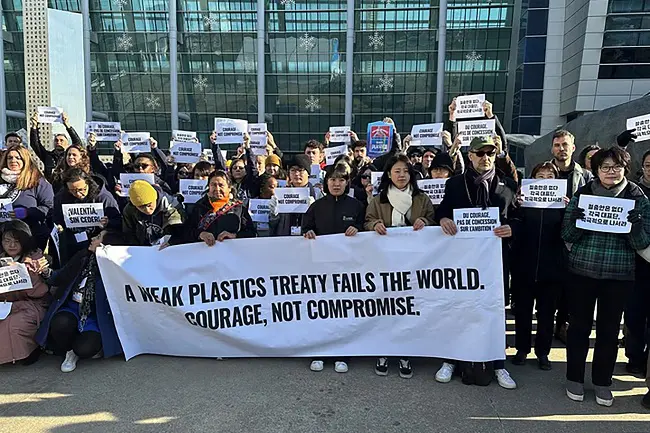Olusegun Ariyo
Negotiations to draft a Legally binding to Tackle the global Plastic Pollution Crisis have ended without an agreement, as countries failed to agree on key issues like cutting plastic production.
Environment activists hold a press conference calling for a strong global plastics treaty outside of the venue for the fifth session of the Intergovernmental Negotiating Committee on Plastic Pollution in Busan, South Korea. Photo credit: AP
Delegates agreed to meet again next year to continue talks after a week of negotiations between almost 200 countries in Busan, South Korea, failed to agree on core issues like production cap, finance and harmful chemicals.
Small island nations, who are the most affected by plastics pollution, and a group of African nations as well as several European and developing countries refused to accept a draft proposal released by the chair of the UN talks which was slammed by observers as weak.
“We did not accept a weak treaty here, and we never will,” Juan Carlos Monterrey Gomez, of Panama, said at the plenary, receiving a long round of applause from delegates.
Chair Luis Vayas Valdivieso said progress had been made but he acknowledged “we must also recognise that a few critical issues still prevent us from reaching a comprehensive agreement.”
“There is a general agreement to resume the current session at a later date to conclude our negotiations,” he told delegates.
Sunday, December 1, 2024, was the scheduled end of the UN Intergovernmental Negotiating Committee (INC-5) talks, but the plenary couldn’t start until 9 pm after a draft text released by the presidency showed multiple unresolved provisions.
The text released late on Sunday ahead of the final plenary, was filled with brackets, providing multiple options on key issues such as binding targets to cut plastic production, regulating harmful chemicals, and funding support for developing nations, where no consensus had been reached.
Global South countries and campaigners said the proposal failed to address the root causes of plastic pollution, while campaigners said the text was “weak” and lacked ambition.
“The draft on the table does not yet provide a clear path to a successful outcome, drowning humanity in a sea of brackets,” Greenpeace said. “Chasing the lowest ambition will not deliver a treaty that the people and planet desperately need.”
Early on Sunday, Global South countries called out the lack of transparency in the process and threatened to walk out without a treaty.
“No text is better than bad text,” said, Cheikh Ndiaye Sylla, Senegal’s National Focal Point.
Dr Sam Adu-Kumi, Ghana’s lead negotiator, said: “The whole world is looking up to us… We are not here to accept anything short of an ambitious treaty.”
At the heart of the impasse was whether the treaty would include limits on plastic production. Over 100 nations, including small islands, African nations and several European and developing countries like Norway and Mexico, back a proposal to set a global target for reducing plastic production.
The amount of plastics the world is producing has been growing exponentially and could climb about 70 per cent by 2040 without policy changes.
Plastic waste is clogging beaches, polluting soil, air and water with Microplastic Sleeping Into Human Organs and even breast milk. Many chemicals associated with plastics have been known to cause harm to health.
However, key petrochemical-producing nations like Saudi Arabia oppose production caps, calling instead for a focus on waste management. Campaigners said the heavy presence of Fossil fuel Lobbyists was Also derailing the negotiations In the final days, delegates had already started preparing for an action plan beyond Busan, as it became obvious there was no chance of a consensus.
Some experts said that even if a legally binding treaty is not created in Busan, there is still a chance of having a blueprint for future negotiations.
“There’s no way to finish the text here. The next step is agreeing on a process for beyond Busan,” Bjorn Beeler, executive director of the International Pollutants Elimination Network (IPEN), said.
Hugo Schally, Advisor for International Negotiations, Director General for the Environment, European Commission said: “The EU is disappointed by the outcome of INC-5: we didn’t get what we came here for: a legally binding treaty with decisive action against plastic pollution, a treaty that brings concrete change for nature and the marine environment and for all the people around the world. We need these measures, in addition to waste management and a fair share of the private sector through extending the responsibility of producers. That’s the bare minimum that can have an impact and that we can accept.
-plastics-treaty-talks-collapse-as-“But we feel encouraged and empowered by a growing number of countries sharing the same ambitions – and the number of countries continues to grow. The EU was and will continue to be a driving force for an ambitious agreement. We will work further in good faith with others to leap to ending plastic pollution.”
Olga Givernet, Minister Delegate for Energy of France, said: “We hope that the 5.2 process can move forward before June 2025. The aim is to reach an ambitious agreement that will enable us to address all the causes of pollution, from production and the need to reduce it, to the inclusion of chemicals of concern and end of life.
“Our work has not been in vain. It has enabled us to move forward, try to understand each other and take into account all points of view. We’re back on track with the text as proposed by the Presidency, so we still need to refine everyone’s positions if we’re to have an ambitious treaty.
“We still have a minority of countries that continue to obstruct us, as we saw again during this plenary session, and we hope to be able to remove these obstructions and work towards convergence. We must always have confidence in multilateralism and work to ensure that countries can talk to each other.”
Ms. Maria Angelica Ikeda, Director of the Department of Environment, Ministry of Foreign Affairs, Brazil, said: “Brazil has, once again, come to the INC ready to commit to a robust agreement, both on financing and means of implementation and on the obligations to end plastic pollution. We also facilitated negotiations, be it as co-chair or co-facilitators, always trying to advance difficult issues such as chemicals of concern, plastic products, health and means of implementation.
“Although we would have wanted to see the final text adopted, we recognise that progress was made and are ready to keep on contributing, as much as we can, to offer ideas and proposals or to facilitate understandings amongst different countries. We are optimistic that we will achieve a good, meaningful, strong result in our next meeting.”
Christina Dixon, Ocean Campaign Lead at Environmental Investigation Agency (EIA), said: “We have run out of time in Busan to land a global plastics treaty and have ultimately failed to live up to the mandate and opportunity handed to us. These negotiations have been captured by plastic and petrochemical industries and their aligned countries, who have no intention to address plastic pollution or let others do so. In the face of this obstructionism, large groups of diverse countries led rallying calls for an ambitious treaty. We have won the hearts and minds of the majority of the world and will continue to fight in solidarity with those seeking real solutions to end the harms of plastic pollution.”
Ana Rocha, Global Plastics Policy Director, GAIA, said: “We welcome Member States’ willingness to fight for a better deal instead of rushing into a weak treaty for the sake of an arbitrary deadline. But we cannot keep doing things the same way and expect different results– that is the definition of insanity. The ambitious majority needs to do whatever it takes to get these negotiations back on track and reclaim the spirit of multilateralism. Now is not the time for timidity. It is time to fight for our collective survival.”
International Indigenous Peoples’ Forum on Plastics said: “Indigenous Peoples, and other frontline and fenceline communities, and civil society have been flagrantly excluded throughout the INC process. The Chair’s failure to effectively facilitate negotiations for a just and equitable plastics treaty has brought us down a dead-end path, perpetuating harm to the most impacted peoples and communities.”
Amena Yauvoli, Fiji’s Ambassador to Indonesia, said: “Fiji is deeply disappointed with the procedural processes adopted during these negotiations and informal meetings, which caused significant delays, disrupted progress, and placed undue pressure on small delegations. The restrictive rules of procedure hindered effective engagement, particularly for observers, scientists, and Indigenous rights holders. We wish to emphasise that while this is a member-state-driven process, true multilateralism demands balanced, equitable participation to ensure this treaty works for all.
“We can only protect what we know, and our children carry the hope nurtured by elders who once lived in communities free of plastic pollution. It’s important to recognize that plastic pollution is worsening the triple planetary crisis, with the Pacific Islands experiencing its effects most acutely. I urge everyone to understand that choosing inaction now puts you at risk of facing these consequences in time – and if there’s one thing, we know about plastics is that they are persistent pollutants that last generations.
“We have a unique opportunity before us, one that carries the weight of a mandate. We can develop a treaty that becomes a lasting legacy, demonstrating our resilience and commitment to our planet and future generations.”
Juan Monterrey, Special Representative for Climate Change & National Climate Change Director of the Ministry of Environment of Panama, said: “We didn’t achieve what we came for – a binding treaty that addresses the full lifecycle of plastics. Yet, amidst disappointment, there are small glimmers of progress.
“We have built a coalition of over 100 nations united by the shared commitment to end plastic pollution. This coalition has stood and will continue to stand firm for ambition – demanding action on chemicals of concern, reductions in harmful plastic production, and the financial mechanisms needed to support a fair transition in developing countries.
“The momentum is with this overwhelming majority, even if the challenges are still daunting. Every day of delay is a day against humanity. Postponing negotiations does not postpone the crisis. By the time we reconvene: 230 million tons of plastic will enter our oceans, another million marine animals will die, and will further contaminate the ocean food chain.
“Microplastics will continue to infiltrate our water, food, and bodies. Every child born in the next six months will carry this poison in their bloodstream. Human bodies will further devolve into toxic waste dumps.
“Communities will endure the lasting effect of plastic pollution, and farmers will face crop losses as soils saturate with microplastics. This is not just an environmental crisis it’s a moral failure. An entire generation is being poisoned by chemicals in plastics – chemicals linked to cancers, hormonal disruptions, and developmental disorders.
“Panama came to Busan committed to building bridges, not walls. We crossed our red lines for the sake of compromise and multilateralism. And while your current text is far from what we envisioned, it provides a basis to continue.
“We didn’t accept a weak treaty here, and we never will.
“We have two fundamental beliefs. First, we understand that the triple planetary crisis of climate, plastic pollution and biodiversity loss, is a threat to the very existence of our country and its people.
“But also, Panama is deeply committed to multilateralism, and we understand that it is through dialogue, bridge-building and honest-to-God diplomacy that multilateralism must be able to face the biggest challenge of our times.
“However, our disposal to negotiate does not mean we will lower our expectations of what this treaty SHOULD be able to achieve and encompass.
“To the 120 nations standing for ambition, I say: let us be relentless. We may have been delayed, but we will not be stopped.
“To the activists and civil society who have carried this fight: you are the heartbeat of this movement. Your courage and relentless pursuit of justice keep this fight alive. Rest, recharge, and return stronger.
“To indigenous peoples and local communities: your wisdom is our guide. You continue to show the world what harmony with nature truly means.
“To the media: continue to tell the truth.
“To young people: your anger is justified. Your fear is valid. I share it. But remember that your voices are louder than the billions spent polluting. Your generation will save us all.
“This is not about commas or brackets. It’s about a child in a coastal village who will drink water poisoned by plastic tomorrow. It’s about the fisherman pulling in empty nets filled with waste. It’s about the millions of species we are sentencing to extinction. It is About 90% of all drinking water sources currently poisoned by plastic.
“Panama leaves Busan with fire in our hearts. When we reconvene, the stakes will be higher, the devastation will be worse, and the opportunity to act will be even smaller. But Panama and the more than 100 nations that demand action will return stronger, louder, and more determined than ever. Delay is death. Action is survival. We are eating and drinking poison every single day. The world cannot afford our hesitation any longer.”
Camila Zepeda, Head of Delegation for Mexico, Head of the International Affairs Unit at SEMARNAT, Mexico’s Chief Climate and Biodiversity Negotiator, said: “We carry the weight of expectations of our citizens – who are counting on us to protect them and the environment from the plastic pollution crisis. We must do everything within our power to meet this expectation.
“This is our shared determination: to ensure this instrument will target and eliminate the most urgent risks of plastic pollution at the global level.
“The Article on Plastic Products and Chemicals in the instrument text must contain a clear, legally binding obligation to phase out the most harmful plastic products and chemicals of concern in plastics.
“Without such an obligation, the instrument will fail to deliver the predictable regulatory framework urgently needed by states, businesses, civil society and the environment.
“A treaty without clear legally binding rules is not acceptable. It would reflect neither the ambition nor the specific text proposals supported by the vast majority of states in these negotiations. It would be a treaty in name only.
“A legally binding obligation to phase out those most harmful plastic products and chemicals of concern in plastics is a cornerstone for an effective treaty. It is what we must do to protect human health and the environment from plastic pollution as promised by UNEA Resolution







